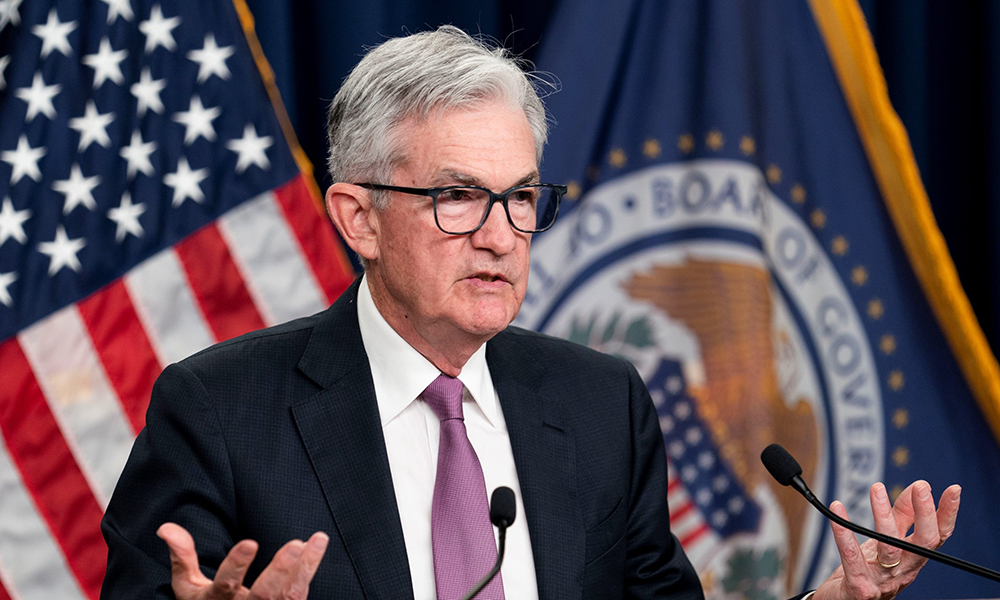
在2008年的金融大危机(Great Financial Crisis)重创美国经济后的几年里,华尔街爱上了那句古老咒语:“不要和美联储对着干。”
这句话是金融学教授、著名投资人马丁·茨威格于1970年提出的,阐释了美联储(Federal Reserve)的政策与股市走向之间的强烈相关性。
道理很简单,大致是这样的:当美联储实施宽松的货币政策时,市场往往会走高,波动性被抑制,投资者的风险是有限的,因此应当乘势而上、持续投资。当美联储站在你这边的时候,为什么要卖出股票,“和美联储对着干”?
在美国房地产泡沫破裂后的复苏过程中,美联储将利率维持在接近零的水平,实施量化宽松政策,通过购买抵押贷款支撑的证券和美国国债,以增加货币供应,希望能够刺激贷款和投资,投资者正是掌握了上述原理,大量买入股票。
央行的宽松政策促成了标准普尔500指数(S&P 500)历史上第二长的牛市,从2009年3月9日直到2020年新冠肺炎疫情引发熊市,让这只蓝筹股指数的投资者获得了400%的回报。
不过现在,眼看通货膨胀已经成为美国和世界各地持续面临的问题,美联储的官员采取了新的立场。而这一次的政策对投资者的吸引力要小得多。
美联储今年已经四次加息,并开始收缩资产负债表,此前数年的量化宽松政策将其资产规模推高至近9万亿美元。目标是为经济降温,降低通货膨胀,但迄今为止,这些努力尚未取得成效。
9月13日,美国劳工统计局(Bureau of Labor Statistics)公布,8月的通胀率再次出人意料地上升,较上年同期上升8.3%。尽管9月的汽油价格下降了10.6%,但经济学家对核心通胀的上升表示担忧,而核心通胀还不包括波动较大的食品和能源价格。
因此,美国银行(Bank of America)的经济学者在9月14日表示,他们认为美联储将在下次会议上再加息75个基点。野村证券(Nomura)的经济学家甚至认为,很有可能加息100个基点。
全新的含义
Satori Fund的创始人丹·奈尔斯认为,再次加息意味着“不要和美联储对着干”有了全新的含义。
美联储主席杰罗姆·鲍威尔宣布他将“无条件地”对抗通胀,华尔街最喜欢的咒语现在成了一句警示,警告投资者避开股市,或至少采取更保守的投资方式。
“不要和美联储对着干,也不要和基本面对着干。”奈尔斯于9月12日向美国消费者新闻与商业频道(CNBC)表示。他警告投资者,在美联储收紧政策期间出现的任何股市反弹,对投资者而言都是熊市陷阱。
奈尔斯是斯坦福大学(Stanford University)的电气工程硕士,曾经在雷曼兄弟(Lehman Brothers)工作。自2021年12月以来,他一直主张投资者应该在投资组合中持有大量现金,本周他重申了这一观点。
他说:“我认为,对于那些不能每天交易的散户来说,就像我们今年一直强调的,你宁愿因为通胀而贬值5%到7%,也不应该因为市场下跌而亏掉30%到50%,我认为市场下跌将持续到明年。”
这位对冲基金首席执行官在今年3月透露,他已经将自己管理的基金中25%的资产配置为现金。截至今年4月,他管理着近15亿美元的资产。
他在9月12日表示,该基金还增持了“大量空头股”,尤其是“云计算软件”。
通过做空一家公司,投资者可以在该公司股价下跌时获利。
但奈尔斯也持有一些多头仓位,他特别强调了一家在经济衰退期间可能表现良好的公司:沃尔玛(Walmart)。他指出,这家零售商在金融大危机期间的表现明显好于同行和大盘。
不过,奈尔斯并不看好未来一年的股市。他说,从历史上看,当以消费者价格指数(CPI)衡量的通货膨胀率高于5%时,标准普尔500指数的市盈率会达到12倍。
如今,标准普尔500指数的市盈率为19倍,而通胀率为8.3%,这意味着从历史基准来看,股票价格偏高。此外,奈尔斯认为,随着利率上升,今年企业收益将继续下降。
对投资者来说,这位对冲基金首席执行官的言论应该是一个警示,提醒他们在美联储新的政策环境下要更加谨慎,因为“不要和美联储对着干”有了全新含义。(财富中文网)
译者:Agatha
在2008年的金融大危机(Great Financial Crisis)重创美国经济后的几年里,华尔街爱上了那句古老咒语:“不要和美联储对着干。”
这句话是金融学教授、著名投资人马丁·茨威格于1970年提出的,阐释了美联储(Federal Reserve)的政策与股市走向之间的强烈相关性。
道理很简单,大致是这样的:当美联储实施宽松的货币政策时,市场往往会走高,波动性被抑制,投资者的风险是有限的,因此应当乘势而上、持续投资。当美联储站在你这边的时候,为什么要卖出股票,“和美联储对着干”?
在美国房地产泡沫破裂后的复苏过程中,美联储将利率维持在接近零的水平,实施量化宽松政策,通过购买抵押贷款支撑的证券和美国国债,以增加货币供应,希望能够刺激贷款和投资,投资者正是掌握了上述原理,大量买入股票。
央行的宽松政策促成了标准普尔500指数(S&P 500)历史上第二长的牛市,从2009年3月9日直到2020年新冠肺炎疫情引发熊市,让这只蓝筹股指数的投资者获得了400%的回报。
不过现在,眼看通货膨胀已经成为美国和世界各地持续面临的问题,美联储的官员采取了新的立场。而这一次的政策对投资者的吸引力要小得多。
美联储今年已经四次加息,并开始收缩资产负债表,此前数年的量化宽松政策将其资产规模推高至近9万亿美元。目标是为经济降温,降低通货膨胀,但迄今为止,这些努力尚未取得成效。
9月13日,美国劳工统计局(Bureau of Labor Statistics)公布,8月的通胀率再次出人意料地上升,较上年同期上升8.3%。尽管9月的汽油价格下降了10.6%,但经济学家对核心通胀的上升表示担忧,而核心通胀还不包括波动较大的食品和能源价格。
因此,美国银行(Bank of America)的经济学者在9月14日表示,他们认为美联储将在下次会议上再加息75个基点。野村证券(Nomura)的经济学家甚至认为,很有可能加息100个基点。
全新的含义
Satori Fund的创始人丹·奈尔斯认为,再次加息意味着“不要和美联储对着干”有了全新的含义。
美联储主席杰罗姆·鲍威尔宣布他将“无条件地”对抗通胀,华尔街最喜欢的咒语现在成了一句警示,警告投资者避开股市,或至少采取更保守的投资方式。
“不要和美联储对着干,也不要和基本面对着干。”奈尔斯于9月12日向美国消费者新闻与商业频道(CNBC)表示。他警告投资者,在美联储收紧政策期间出现的任何股市反弹,对投资者而言都是熊市陷阱。
奈尔斯是斯坦福大学(Stanford University)的电气工程硕士,曾经在雷曼兄弟(Lehman Brothers)工作。自2021年12月以来,他一直主张投资者应该在投资组合中持有大量现金,本周他重申了这一观点。
他说:“我认为,对于那些不能每天交易的散户来说,就像我们今年一直强调的,你宁愿因为通胀而贬值5%到7%,也不应该因为市场下跌而亏掉30%到50%,我认为市场下跌将持续到明年。”
这位对冲基金首席执行官在今年3月透露,他已经将自己管理的基金中25%的资产配置为现金。截至今年4月,他管理着近15亿美元的资产。
他在9月12日表示,该基金还增持了“大量空头股”,尤其是“云计算软件”。
通过做空一家公司,投资者可以在该公司股价下跌时获利。
但奈尔斯也持有一些多头仓位,他特别强调了一家在经济衰退期间可能表现良好的公司:沃尔玛(Walmart)。他指出,这家零售商在金融大危机期间的表现明显好于同行和大盘。
不过,奈尔斯并不看好未来一年的股市。他说,从历史上看,当以消费者价格指数(CPI)衡量的通货膨胀率高于5%时,标准普尔500指数的市盈率会达到12倍。
如今,标准普尔500指数的市盈率为19倍,而通胀率为8.3%,这意味着从历史基准来看,股票价格偏高。此外,奈尔斯认为,随着利率上升,今年企业收益将继续下降。
对投资者来说,这位对冲基金首席执行官的言论应该是一个警示,提醒他们在美联储新的政策环境下要更加谨慎,因为“不要和美联储对着干”有了全新含义。(财富中文网)
译者:Agatha
In the years after the Great Financial Crisis devastated the U.S. economy in 2008, Wall Street fell in love with an old mantra: “Don’t fight the Fed.”
The phrase was coined in 1970 by Martin Zweig, a finance professor and famed investor, to explain the strong correlation between Federal Reserve policy and the direction of the stock market.
It’s a simple idea that goes something like this: When the Federal Reserve’s monetary policy is loose, markets tend to move higher, volatility is subdued, and investors’ risk is limited, so it makes sense to stay invested and ride the wave. Why “fight the Fed” by selling stocks when it’s on your side?
Investors understood this dynamic during the recovery from the bursting of the U.S. housing bubble, buying stocks in droves while the Fed held interest rates near zero and instituted a policy called quantitative easing—where it bought mortgage-backed securities and U.S. Treasuries to increase the money supply in hopes of spurring lending and investment.
The central bank’s loose policies helped bring about the second longest bull market in the S&P 500’s history, between Mar. 9, 2009, and the COVID-19–induced bear market of 2020, leaving investors in the blue-chip index with a 400% return.
Now though, with inflation becoming a persistent issue in the U.S. and around the world, Fed officials have taken a new stance. And this one is far less appealing for investors.
The central bank has raised interest rates four times this year, and begun shrinking its balance sheet after years of quantitative easing pushed its holdings to nearly $9 trillion. Its goal is to cool the economy and reduce inflation, but so far the efforts haven’t been fruitful.
On September 13, the Bureau of Labor Statistics revealed that inflation once again surprised to the upside in August, rising 8.3% from the same period a year ago. Despite a 10.6% drop in gasoline prices during the month, economists are concerned about rising core inflation, which excludes volatile food and energy prices.
As a result, Bank of America’s economists said on September 14 that they believe the Fed will hike rates by another 75 basis points at their next meeting. And Nomura’s economists even argued a 100 basis point rate hike could be in the cards.
A whole new meaning
For Satori Fund founder Dan Niles, yet another interest rate hike means that “Don’t fight the Fed” has a whole new meaning.
With Fed Chair Jerome Powell declaring that his inflation fight is “unconditional,” Wall Street’s favorite mantra is now a warning to avoid stocks, or at least to take a more conservative approach to investing.
“Don’t fight the Fed, and don’t fight the fundamentals,” Niles told CNBC on September 12, warning investors that any stock market rallies that come amid Fed tightening are nothing but bear market traps for investors.
Niles, who holds a master’s in electrical engineering from Stanford and once worked for Lehman Brothers, has argued since December that investors should hold a large portion of their portfolio in cash, and he repeated that call this week.
“I think for the retail investor that can’t daily trade their portfolio, you’re better off losing, as we’ve said consistently this entire year, 5% to 7% to inflation, rather than potentially 30% to 50% to a market decline which I think will continue into next year,” he said.
The hedge fund chief revealed in March that his fund has allocated 25% of its holdings to cash. He managed nearly $1.5 billion in assets as of April.
And on September 12, he said that the fund has also added “a lot of shorts” to its holdings, particularly in ”cloud-oriented software names.”
By shorting a company, investors can earn a profit when its stock falls.
But Niles also holds some long positions, and he emphasized one in particular that could do well during a recession: Walmart, noting that the retailer outperformed its peers and the broader markets substantially during the Great Financial Crisis.
Still, Niles isn’t bullish about the stock market over the coming year. Historically, when inflation, as measured by the consumer price index (CPI), is above 5%, the S&P 500 has traded at 12 times the earnings it generated over the prior year, he said.
Today, the S&P is trading at 19 times trailing earnings with inflation sitting at 8.3%, meaning stocks are expensive on a historical basis. And, on top of that, Niles believes corporate earnings will continue to fall this year as interest rates rise.
For investors, the hedge fund chief’s comments should be a warning to take a more cautious approach in this new environment of Federal Reserve policy, because “Don’t fight the Fed” has a whole new meaning.






